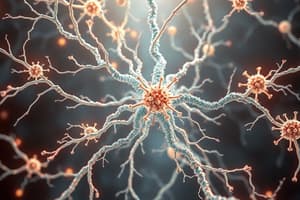Podcast
Questions and Answers
What role do inhibitory molecules play in CNS injury?
What role do inhibitory molecules play in CNS injury?
- They promote inflammation in the CNS.
- They enhance axon regeneration.
- They facilitate the activation of growth factors.
- They limit axon regeneration. (correct)
Which therapeutic strategy is not aimed at enhancing axon regeneration?
Which therapeutic strategy is not aimed at enhancing axon regeneration?
- Inducing apoptosis of oligodendrocytes. (correct)
- Engineering scaffolds to guide axon growth.
- Delivery of growth factors to the injury site.
- Gene therapy to adjust gene expression.
What is a significant impediment to axon regeneration following CNS injury?
What is a significant impediment to axon regeneration following CNS injury?
- Activation of supportive glial cells.
- Enhanced blood flow to the injury site.
- Presence of growth inhibitory proteins. (correct)
- Removal of damaged axons.
What future direction in axon regeneration research involves understanding molecular mechanisms?
What future direction in axon regeneration research involves understanding molecular mechanisms?
What is one proposed strategy to support the regeneration of axons according to the content?
What is one proposed strategy to support the regeneration of axons according to the content?
What primary role do Schwann cells play in the regeneration of peripheral nerves?
What primary role do Schwann cells play in the regeneration of peripheral nerves?
Which factor is NOT known to influence axon regeneration?
Which factor is NOT known to influence axon regeneration?
Which of the following occurs in the process of peripheral nerve regeneration?
Which of the following occurs in the process of peripheral nerve regeneration?
What is one significant difference between peripheral nerve regeneration and central nervous system regeneration?
What is one significant difference between peripheral nerve regeneration and central nervous system regeneration?
Which molecular event is involved in axon regeneration after an injury?
Which molecular event is involved in axon regeneration after an injury?
What role do growth-associated proteins (GAPs) play in axon regeneration?
What role do growth-associated proteins (GAPs) play in axon regeneration?
What is a factor that might hinder axon regeneration?
What is a factor that might hinder axon regeneration?
Which statement about the regenerative capacity of peripheral nerves is true?
Which statement about the regenerative capacity of peripheral nerves is true?
Flashcards
Nogo, MAG, OMgp
Nogo, MAG, OMgp
Inhibitory molecules in CNS that prevent axonal regeneration
CNS injury
CNS injury
Damage to the central nervous system (brain and spinal cord).
Axon regeneration
Axon regeneration
Regrowth of nerve fibers after injury
Growth factors/signaling molecules
Growth factors/signaling molecules
Signup and view all the flashcards
Therapeutic strategies
Therapeutic strategies
Signup and view all the flashcards
Peripheral Nerve Regeneration
Peripheral Nerve Regeneration
Signup and view all the flashcards
Schwann Cells
Schwann Cells
Signup and view all the flashcards
Wallerian Degeneration
Wallerian Degeneration
Signup and view all the flashcards
Central Nervous System (CNS)
Central Nervous System (CNS)
Signup and view all the flashcards
Growth Cone Formation
Growth Cone Formation
Signup and view all the flashcards
Molecular Events (regeneration)
Molecular Events (regeneration)
Signup and view all the flashcards
Regeneration Factors (Impacting Regeneration)
Regeneration Factors (Impacting Regeneration)
Signup and view all the flashcards
Study Notes
Introduction to Axon Regeneration
- Axon regeneration, the regrowth and reestablishment of connections between neurons, is a complex process varying significantly based on the organism and the specific injury.
- Some species exhibit remarkable axon regeneration capacity, while others have limited ability.
- In mammals, including humans, peripheral nerve regeneration demonstrates a capacity superior to that in the central nervous system (CNS).
Mechanisms of Axon Regeneration
- Axonal regeneration involves a cascade of molecular events, including cellular signaling pathways activated by the injury, microtubule reorganization, gene expression changes, growth cone formation and guidance, and synaptic re-establishment.
- Key proteins and growth factors are crucial for facilitating this process.
- Growth-associated proteins (GAPs) and other cell signaling molecules guide axons to their targets.
Factors Affecting Axon Regeneration
- Regeneration success depends on factors like the nature and severity of the injury, cell types involved (neurons, Schwann cells, etc.), the cellular environment around the injury site, the organism's age, and genetic factors.
- Scar tissue formation and inflammatory responses, affecting the microenvironment, can hinder regeneration.
- Immune system activity also impacts regeneration.
Peripheral Nerve Regeneration
- Peripheral nerves outside the CNS possess considerable regenerative capacity.
- Schwann cells play a critical role in guiding regenerating axons towards their targets, forming supportive tunnels and supplying trophic support and signaling cues.
- Regeneration in peripheral nerves involves axon fragmentation, Wallerian degeneration, growth cone formation and outgrowth, and re-innervation of target cells.
- Regeneration ability depends on the injury's extent and the involved cell types.
Central Nervous System Regeneration
- The CNS exhibits a limited capacity for axon regeneration compared to peripheral nerves.
- Myelinating oligodendrocytes in the CNS, unlike Schwann cells in the PNS, typically do not promote neurite growth.
- Inhibitory molecules like Nogo, Myelin-associated glycoprotein (MAG), and Oligodendrocyte myelin glycoprotein (OMgp) significantly impede CNS axon regeneration.
- Microglia activation and subsequent inflammatory response hinder CNS regeneration.
Therapeutic Strategies for Enhancing Axon Regeneration
- Researchers explore various therapeutic strategies, including growth factor and signaling molecule delivery to injury sites, gene therapy to alter gene expression and overcome inhibitory signals, engineering scaffolds to guide axon growth, stem cell transplantation, and growth cone creation on axons.
- Strategies aim to mitigate inhibitory signals and enhance beneficial cellular interactions—including removing inhibitory molecules and promoting Schwann cell-like activity to guide regeneration.
Future Directions
- Future research focuses on understanding the molecular mechanisms promoting CNS regeneration, overcoming inhibitory signals, and developing new therapeutic strategies.
- Development of improved therapies holds immense potential for treating severe neurological conditions.
Studying That Suits You
Use AI to generate personalized quizzes and flashcards to suit your learning preferences.




